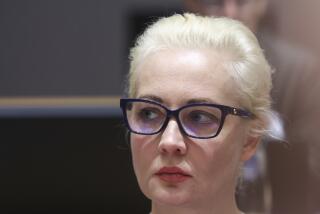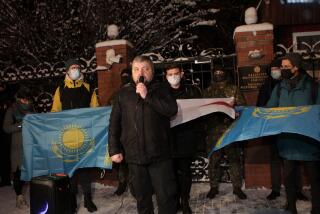Lydia Chukovskaya; Writer, Defender of Russian Intellectuals
- Share via
MOSCOW — Lydia Chukovskaya, staunch defender of persecuted intellectuals and herself a respected editor and writer who chronicled life under Stalin, died Thursday. She was 88.
“Our literature has lost an exquisite connoisseur of Russian poetry and a precious witness of the Soviet half-century,” author and Nobel Prize laureate Alexander Solzhenitsyn said in a statement.
The ITAR-Tass news agency said Chukovskaya died in Moscow.
Chukovskaya had offered Solzhenitsyn refuge at her dacha, or country cottage, in the dark days of 1974, shortly before he was expelled from the Soviet Union.
Her defense of Solzhenitsyn and of dissident physicist Andrei D. Sakharov contributed to her ouster from the Soviet Writers’ Union that same year. She was reinstated in 1989.
Chukovskaya was famous for her memory, saving countless poems from destruction by learning them by heart. She recalled her friendship with a great 20th century Russian poet in “Notes on Anna Akhmatova.”
The daughter of Kornei Chukovsky, a Russian writer best known for his childrens stories, she grew up in the lively literary atmosphere of St. Petersburg before the 1917 Bolshevik revolution.
Two of her best-known works were the novel “Sofiya Petrovna” and the semiautobiographical book “The Deserted House,” which described the Stalinist purges of the 1930s. Her own husband, Matvei Bronshtein, was a victim of those purges.
Another of Chukovskaya’s novels, “Going Under,” describes how Soviet power corrupted many writers.
“Literature is not subject to penal law. One must confront ideas with ideas, not with camps and prisons,” she wrote in an open letter to the Communist Party in defense of writers Andrei Sinyavsky and Yuli Daniel.
Chukovskaya will be buried in Peredelkino, a writers colony west of Moscow, alongside her father and many of her friends, including Nobel Prize-winning author Boris Pasternak.
More to Read
Sign up for Essential California
The most important California stories and recommendations in your inbox every morning.
You may occasionally receive promotional content from the Los Angeles Times.












